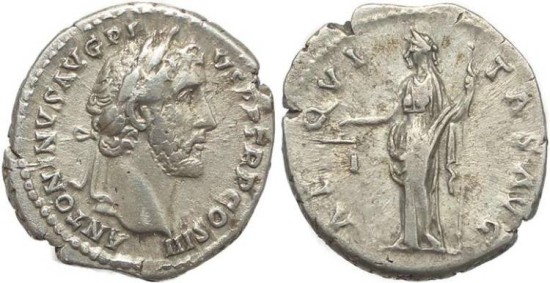Additional References: RSC 14
Notes: Laureate head right / Aequitas standing left, holding scales and rod.
Obverse: Antoninus Pius (Latin: Titus Fulvus Aelius Hadrianus Antoninus Augustus Pius; 19 September, 86 AD – 7 March, 161 AD), also known as Antoninus, was Roman Emperor from 138 to 161. He was one of the Five Good Emperors in the Nerva–Antonine dynasty and the Aurelii. He acquired the name Pius after his accession to the throne, either because he compelled the Senate to deify his adoptive father Hadrian, or because he had saved senators sentenced to death by Hadrian in his later years.
Antoninus was born near Lanuvium and his mother was Arria Fadilla. Antoninus’ father died shortly after his 89 ordinary consulship, his son being raised by his maternal grandfather Gnaeus Arrius Antoninus, reputed by contemporaries to be a man of integrity and culture and a friend of Pliny the Younger. The Arrii Antoninii were an older senatorial family from Italy, very influential during Nerva‘s reign. Arria Fadilla, Antoninus’mother, married afterwards Publius Julius Lupus, a man of consular rank, suffect consul in 98, and two daughters, Arria Lupula and Julia Fadilla, were born from that union.
Two days before his death, the biographer reports, Antoninus was at his ancestral estate at Lorium, in Etruria, about twelve miles (19 km) from Rome. He ate Alpine cheese at dinner quite greedily. In the night he vomited; he had a fever the next day. The day after that, 7 March 161, he summoned the imperial council, and passed the state and his daughter to Marcus. The emperor gave the keynote to his life in the last word that he uttered when the tribune of the night-watch came to ask the password—"aequanimitas" (equanimity). He then turned over, as if going to sleep, and died. His death closed out the longest reign since Augustus (surpassing Tiberius by a couple of months).
Antoninus was born near Lanuvium and his mother was Arria Fadilla. Antoninus’ father died shortly after his 89 ordinary consulship, his son being raised by his maternal grandfather Gnaeus Arrius Antoninus, reputed by contemporaries to be a man of integrity and culture and a friend of Pliny the Younger. The Arrii Antoninii were an older senatorial family from Italy, very influential during Nerva‘s reign. Arria Fadilla, Antoninus’mother, married afterwards Publius Julius Lupus, a man of consular rank, suffect consul in 98, and two daughters, Arria Lupula and Julia Fadilla, were born from that union.
Two days before his death, the biographer reports, Antoninus was at his ancestral estate at Lorium, in Etruria, about twelve miles (19 km) from Rome. He ate Alpine cheese at dinner quite greedily. In the night he vomited; he had a fever the next day. The day after that, 7 March 161, he summoned the imperial council, and passed the state and his daughter to Marcus. The emperor gave the keynote to his life in the last word that he uttered when the tribune of the night-watch came to ask the password—"aequanimitas" (equanimity). He then turned over, as if going to sleep, and died. His death closed out the longest reign since Augustus (surpassing Tiberius by a couple of months).
Denomination: In the Roman currency system, the denarius was a small silver coin first minted about 211 BC during the Second Punic War. It became the most common coin produced for circulation but was slowly debased in weight and silver content until its replacement by the double denarius, called the antoninianus, early in the 3rd century AD. The word denarius is derived from the Latin dēnī "containing ten", as its value was 10 asses, although in the middle of the 2nd century BC it was recalibrated so that it was now worth sixteen asses or four sestertii. It is the origin of several modern words such as the currency name dinar; it is also the origin for the common noun for money in Italian denaro, in Portuguese dinheiro and in Spanish dinero.
From Wikipedia
From Wikipedia
Period: Imperial Rome. As the Roman Republic began to implode because of
corruption and infighting among powerful members of the Roman Senate, a new type of
Roman Republican coinage emerges, that of the military strongmen who dominated and
fought among each other before the final fall of the Republic. The drama surrounding
the fall of the Roman Republic is a story full of political intrigue, military action, betrayal,
murder and sex scandals. Different parts of this story have been told and retold by
ancient historians, modern day scholars, dozens of Hollywood movies and even an HBO
miniseries. All of the actors in this great drama, Crassus, Pompey, Julius Caesar, Brutus
and Cassius, Mark Antony and Cleopatra and the last man standing at the end of it all,
Octavian (later known as the first emperor of Rome, Emperor Augustus) all minted coins
during this time bearing their names and propaganda images supporting their factions
and political ideals.
Culture: Ancient Rome. A famous catch phrase "Rome was not built in a day"
definitely applies to the Roman civilization. Rome stated as a series of small villages among the
famous seven hills of Rome along the river Tiber. Eventually through conquest, diplomacy, wise
policies of indirect rule and assimilation, the Romans were able to not only unify the Italian
peninsula, but though a series of brutal wars against regional powers established a great Empire
that spanned Europe, Asia and Africa, making the Mediterrean Sea and "Roman Lake."
All Roman coinage can generally be divided into eight time periods as described below. An interesting thing about Roman coins minted during these eight time periods is that you can literally see the "Rise and Fall" of the Roman Empire on its coinage as the sharp imagery and pure silver and gold coins of the Roman Republic and Early Imperial Period gradually devolves into crude, illegible and heavily debased coins of the "Barracks Emperors" and "Barbarian" Period.
All Roman coinage can generally be divided into eight time periods as described below. An interesting thing about Roman coins minted during these eight time periods is that you can literally see the "Rise and Fall" of the Roman Empire on its coinage as the sharp imagery and pure silver and gold coins of the Roman Republic and Early Imperial Period gradually devolves into crude, illegible and heavily debased coins of the "Barracks Emperors" and "Barbarian" Period.
Item created by: gdm on 2016-08-14 16:40:17. Last edited by gdm on 2016-10-05 10:00:51
If you see errors or missing data in this entry, please feel free to log in and edit it. Anyone with a Gmail account can log in instantly.
If you see errors or missing data in this entry, please feel free to log in and edit it. Anyone with a Gmail account can log in instantly.







